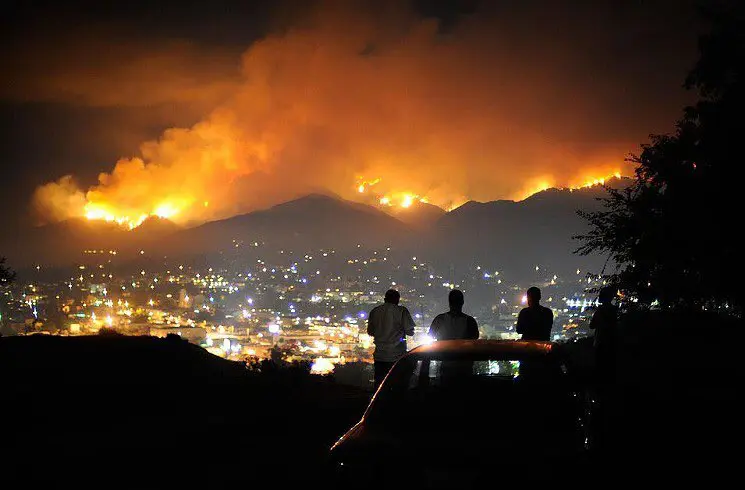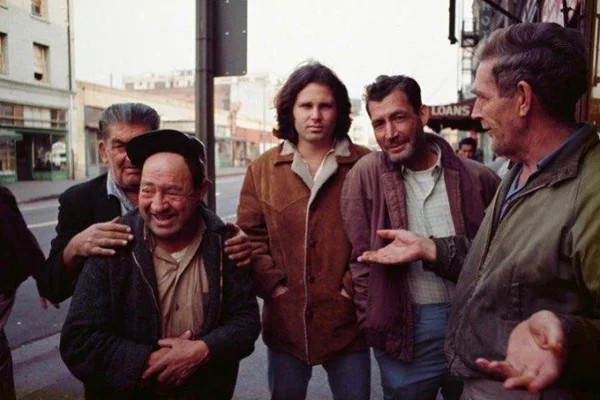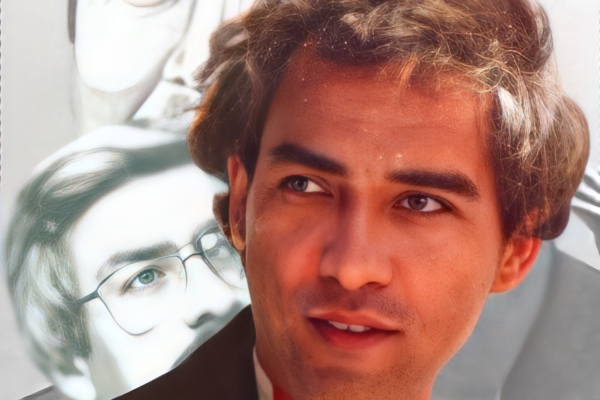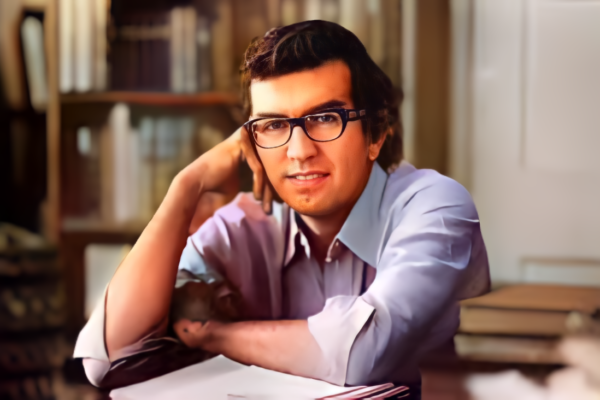The city of dreams and make-believe faces a real life nightmarish devastation as the worst fire in its iconic history ravages the homes and communities of the famous and the obscure alike from Malibu and the Pacific Palisades to Hollywood and Pasadena.
The apocalypse didn’t arrive in Los Angeles with the bang of an earthquake or the roar of a tsunami—it came on the wings of fire, fanned by winds so ferocious they seemed sentient.
“We woke up to a different L.A.,” said Joel Feldman, whose Pacific Palisades home was destroyed as flames swept down from the foothills, consuming everything in their path.
“My neighborhood is gone.”
Or as Theresa Corcoran, who evacuated her fire-threatened Via Bluffs neighborhood for safety at a friend’s house in nearby Bel Air, put it:
“It looks like Armageddon. It’s like the things you only see in the movies.”
More than 14,000 homes and structures have been damaged or destroyed in the Palisades and Eaton fires alone, among them public schools and libraries, businesses and other buildings tens of thousands of residents were fleeing, ordered to evacuate as the inferno marched relentlessly into neighborhoods synonymous with California’s elite.
By the weekend, the fires had destroyed over 40,000 acres of the Los Angeles area—greater than the size of San Francisco.
The devastation will sadly become the worst natural disaster in U.S. history in terms of “scale and scope” as well as “the costs associated with” the destruction and rebuilding Gov. Gavin Newsom predicted.
At least 25 residents have been killed.
Experts have also cautioned that Los Angeles is not yet out of danger—and that these fires could potentially become the costliest wildfire disaster in American history.
As for the loss of homes, it has become clear that in this city with so many celebrities and elite, the rich and the famous haven’t been spared. Those with major losses include comedian Billy Crystal who confirmed that he and his family, including Janice, his wife of nearly 55 years, had lost their home.
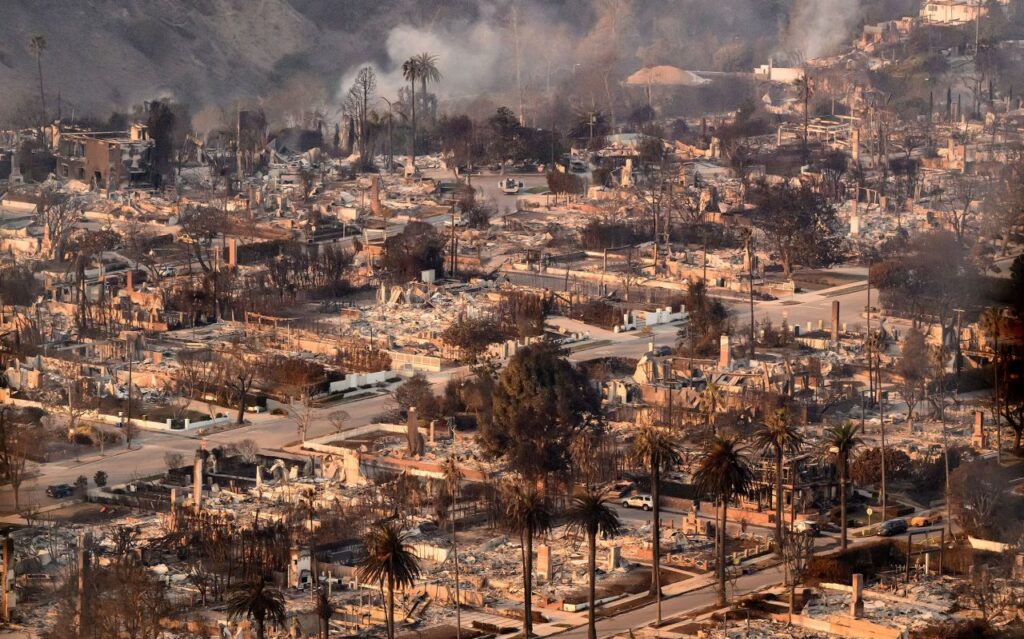
“Words cannot describe the enormity of the devastation we are witnessing and experiencing,” he said a statement.. “We ache for our friends and neighbors who have also lost their homes and businesses in this tragedy.
“Janice and I lived in our home since 1979. We raised our children and grandchildren here. Every inch of our house was filled with love. Beautiful memories that can’t be taken away. We are heartbroken of course but with the love of our children and friends we will get through this.”
And still this fire storm rages on, refusing to be contained and threatened more destruction.
“The magnitude of grief people are experiencing, I don’t think we’ve even touched the surface,” said Los Angeles County Supervisor Lindsey Horvath, who represents Pacific Palisades and other west side areas destroyed by the fires. “This recovery process is going to continue to be painful. The spirit of resilience is alive in Los Angeles County. People are really being tested right now. Their pain is deep.”
Such has been the unprecedented devastation to the city by wildfires that finger-pointing has quickly begun as to the blame for failure to plan ahead for such an inevitability.
City Councilwoman Traci Park, who represents the neighborhoods worst hit by the fires, told the Los Angeles Times she has “more questions than answers” about how an apparent “chronic under-investment” in infrastucture may have “contributed to the fire’s severity.”
The fires raging across Los Angeles and the surrounding county are historic, with more than 2,000 firefighters battling the infernos, officials said during a news conference Wednesday evening.
“This fire storm is ‘the big one’ in magnitude,” said Los Angeles Mayor Karen Bass. “It is staggering.”
“Firefighters are now on scene from across the state and across the country. Los Angeles will rebuild stronger than ever.”
Earlier, however, civic leader and billionaire developer Rick Caruso wasted little time in criticizing Bass to whom he lost the mayoral race two years ago, for the city’s “lack of preparation for the wildfires.”
“We’ve got a mayor that’s out of the country, and we’ve got a city that’s burning,” Caruso said of Bass being who had been in Ghana attending that country’s inauguration of its new president when the fires broke out and only returned to Los Angeles late Wednesday.
On her airport arrival, ss she returned to the U.S., Bass confronted harsh criticism of the city’s firefighting preparation and the handling of the fires. The mayor stood silently refusing to answer a Sky News reporter’s insistent questioning of her decision to go to Africa and her slashing of the Fire Department budget.
“Madam Mayor, have you absolutely nothing to say to the citizens today who are dealing with this disaster?” the reporter asked.
Caruso criticized Bass for doing little to improve the city’s firefighting infrastructure which he compared to that of a “third-world country.”
“There’s no water coming out of the fire hydrants,” he said, due to what he claimed was an inadequately filled reservoir and overall “absolute mismanagement.”
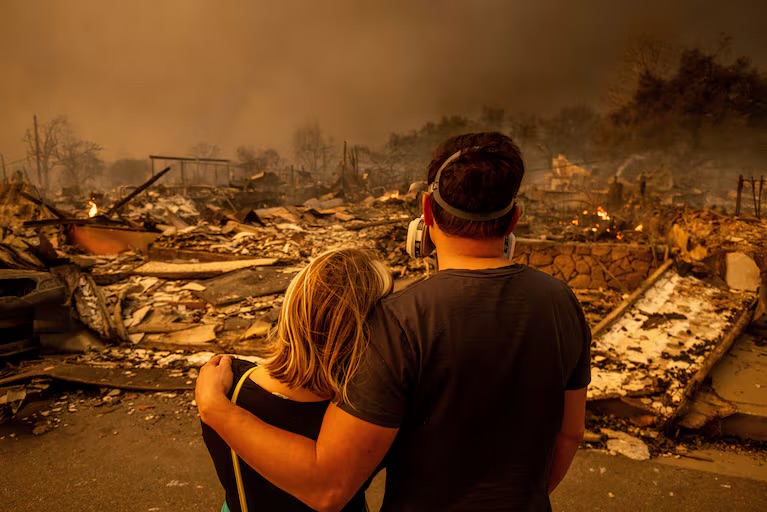
Officials confirmed late in the week that the large Pacific Palisades reservoir that is part of the Los Angeles water supply systeme was out of use when the historic wildfire broke out destroying thousands of homes and other structures nearby.
Known as the Santa Ynez Reservoir, it had been closed for repairs to its cover, empty of the 117 million gallons water stored in the heart of the Palisades.
The revelation comes made as Bass and city officials face increasing questions about why firefighters ran out of water while battling the fires. The empty reservoir lift most hydrants in higher-elevation streets of the Palisades dry as firefighters struggled with low water pressure as they battled the flames.
As a result, fires quickly expanded on the west side of Los Angeles County, stretching farther into Santa Monica and then to the Hollywood Hills and the San Gabriel Valley as the Palisades fire remained uncontained .
Late Wednesday, a fast-moving fire began burning in Runyon Canyon in the Hollywood Hills. The fire was burning south toward Hollywood Boulevard and west toward Laurel Canyon.

According to TMZ, actors Adam Brody and Anna Faris are also among the celebrities most affected by the wildfires ravaging Los Angeles as both lost their homes to the inferno.

“Adam and his wife, actress Leighton Meester, live in the Pacific Palisades, where the first fire started Tuesday morning … and now their home is reduced to rubble and ash,” the celebrity website reported.

TMZ also reported that in Malibu Paris Hilton‘s beachfront home has been reduced to a pile of burning rubble.

Among historic landmarks burned to the ground along the Pacific Coast Highway in Malibu were the Reel Inn, Rosenthal Wine Bar & Patio, Cholada Thai Beach Cuisine, and Malibu Feed Bin, along with multi-million-dollar homes alongside the Pacific Ocean.
In the upscale Palisades, much of the chic downtown section was unrecognizable reduced to structures with skeletal embers of what they had been.
In a Twitter post by @JobVigliotti, “everything around the intersection of Antioch and Swarthmore is nearly or completely incinerated. The Starbucks at 15300 Sunset Blvd. along with adjacent businesses on its same block, as well as the entire stretch of businesses along Antioch in between Swarthmore and Via de la Paz, is simply gone. The stretch of businesses along N Swarthmore from Antioch down to La Cruz Drive appear to have vanished in flames as well.”
The city of dreams became a city of nightmares as luxurious homes crumbled in fiery whirlwinds, their embers swirling into the air like ghostly echoes of lives uprooted.
The tops of iconic palm trees swayed violently against a blood-red sky, their fronds igniting like matchsticks before collapsing into ash.
The city, sprawling as it is, seemed to burn everywhere at once. From the wealthy enclaves of Malibu to the tree-lined streets of Pasadena, famous for the Rose Parade, towering columns of smoke darkened the horizon.
The Santa Ana winds, those infamous harbingers of destruction, screamed through canyons and valleys, reaching speeds of up to 80 miles per hour, with gusts over 100 in the hills. Firefighting aircraft, grounded by the relentless winds, sat useless as exhausted crews fought the flames on foot, their numbers bolstered by off-duty firefighters summoned in desperation.
The best they could do at times was help with the evacuation of residents. Among those evacuated were Hollywood stars like Mark Hamill, Mandy Moore, and James Woods, now reduced to the same vulnerable humanity as the rest of their neighbors, clutching what little they could carry as they fled the relentless blaze.
For some, the fires announced themselves with terrifying immediacy. Flames erupted near a nature preserve in the foothills northeast of the city, spreading so fast that staff at a senior living center scrambled to save dozens of elderly residents. Wheelchairs and hospital beds were pushed down the street into a parking lot as embers rained from the sky.
Some residents, like a 102-year-old woman, sat shivering in their nightclothes, waiting for ambulances and buses to arrive. The scene was both surreal and achingly human—a tableau of vulnerability in a city so often defined by its veneer of invincibility.
The Pacific Palisades, a coastal enclave dotted with multimillion-dollar homes, became ground zero for another blaze. Will Adams, a longtime resident, rushed to pick up his children from St. Matthew’s Parish School as embers ignited the roof of his wife’s car. She abandoned the vehicle, engine still running, and fled on foot toward the ocean, joining a tide of residents making the same desperate trek.
“It’s crazy,” Adams said, his voice tinged with disbelief. “One home’s safe, and the one next to it is gone, swallowed whole.”
On the steep roads leading out of the Palisades, chaos reigned. Traffic jams turned streets into parking lots as desperate families abandoned cars, grabbing pets, children, and a few cherished belongings before setting off on foot. A bulldozer was summoned to shove the empty vehicles aside, clearing a path for emergency responders who were running out of time and options. Ash fell like snow, blanketing everything in a gray pallor, while flames leapt across roads, trapping some residents in pockets of searing heat and choking smoke.
“I didn’t even know there was a fire until my sister called,” said Sheriece Wallace, who mistook the downpour from a water-dropping helicopter for rain. “When I opened my door, the heat hit me like a slap. It was right there.” She managed to escape, but the memory of flames licking at her heels will haunt her long after the skies clear.
Los Angeles County Fire Chief Anthony Marrone described the unfolding tragedy with grim clarity: five lives lost, dozens injured, and more than 6,000 structures reduced to smoldering ruins. “This is unlike anything we’ve seen in years,” he said, his face etched with fatigue.
In the Palisades, the fire jumped famed Sunset Boulevard, torching parts of Palisades Charter High School, immortalized in films like Carrie and Freaky Friday. Along the Pacific Coast Highway, once a scenic escape route, flames consumed homes and businesses alike. Videos captured the devastation: walls of fire raging on either side of the road, residents running through the smoke with dogs in their arms and tears streaming down their faces.
Kelsey Trainor, another Palisades resident, described the sheer terror of trying to flee. “The only road out was blocked,” she said. “We looked across, and the fire had jumped to the other side of the road. People were screaming, crying, grabbing what they could. It felt like the end of the world.”
Further north in Sylmar, a San Fernando Valley neighborhood, another fire tore through the community, prompting more evacuations. And in Riverside County, the Coachella Valley was ablaze. Altogether, six major wildfires raged unchecked, their causes still under investigation. By Thursday, more than 13,000 structures were under threat, and 180,000 residents were without power as utility companies shut off service to prevent further ignitions.
The windstorms that carried the flames were among the most destructive in over a decade, a testament to the intensifying effects of climate change. California’s fire season, once confined to the late summer and fall, now stretches year-round, fueled by rising temperatures and dwindling rainfall. Dry conditions, exacerbated by months of no significant rain, have turned the state into a tinderbox.
Governor Gavin Newsom, who declared a state of emergency, visited the scene and promised resources, but even his words felt small against the scale of the devastation. President Joe Biden, who canceled a planned visit to Riverside County, remained in Los Angeles, where smoke was visible from his hotel.
In a city accustomed to spectacle, this was a tragedy without an audience—a disaster that transcended celebrity and wealth, striking at the heart of what it means to call Los Angeles home. The flames didn’t care about status or fame, only fuel, and the city provided it in abundance.
For days, the skies above LA were a choking gray, the air thick with ash and fear. The once-glamorous hillsides, immortalized in film and song, were blackened and broken.
The apocalypse had arrived, and for those who survived, the question wasn’t just how to rebuild but how to live with the memory of days and nights when the city burned and no one was spared.
“Heartbreaking, devastating, beyond belief., Everything is gone,” longtime Pacific Palisades resident Maria Shriver wrote on Instagram.
“Our neighborhood, our restaurants. All our friends have lost everything.”
Photos from CalMatters, TMZ and The Associated Press

